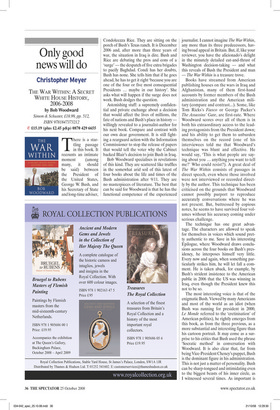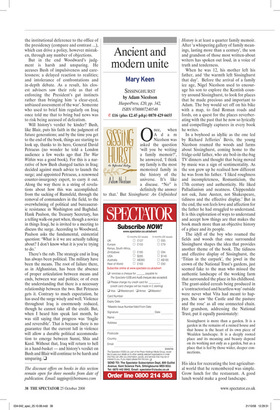Only good news will do
Christopher Meyer
THE WAR WITHIN: A SECRET WHITE HOUSE HISTORY,
2006-2008
by Bob Woodward Simon & Schuster, £18.99, pp. 512, ISBN 9781847373212 ✆ £15.19 (plus £2.45 p&p) 0870 429 6655 There is a startling passage in this book. It recounts an intimate moment (among many, it should be said) between the President of the United States, George W. Bush, and his Secretary of State and long-time adviser, Condoleezza Rice. They are sitting on the porch of Bush’s Texas ranch. It is December 2006 and, after more than three years of war, the situation in Iraq is dire. Bush and Rice are debating the pros and cons of a ‘surge’ — the despatch of five extra brigades to pacify Baghdad. Condi has her doubts, Bush has none. She tells him that if he goes ahead, he has to get it right ‘because you are one of the four or five most consequential Presidents ... maybe in our history’. She asks what will happen if the surge does not work. Bush dodges the question.
Astonishing stuff: a supremely confidential and private exchange about a decision that would affect the lives of millions, the fate of nations and Bush’s place in history — willingly revealed to a journalist-author for his next book. Compare and contrast with our own dear government. It is still fighting a rearguard action with the Information Commissioner to stop the release of papers that would tell the voter why the Cabinet backed Blair’s decision to join Bush in Iraq.
Bob Woodward specialises in revelations of this kind. They are scattered like truffles in the somewhat arid soil of this latest of four books about the life and times of the Bush administration after 9/11. They are no masterpieces of literature. The best that can be said for Woodward is that he has the functional competence of the experienced journalist. I cannot imagine The War Within, any more than its three predecessors, having broad appeal in Britain. But, if, like your reviewer, you have the aficionado’s delight in the minutely detailed cut-and-thrust of Washington decision-taking — and what this reveals of Bush the President and man — The War Within is a treasure trove.
Books have streamed from American publishing houses on the wars in Iraq and Afghanistan, many of them first-hand accounts by former members of the Bush administration and the American military (compare and contrast...). Some, like Tom Ricks’s Fiasco or George Packer’s The Assassins’ Gate, are first-rate. Where Woodward scores over all of them is in both his extraordinary access to the leading protagonists from the President down; and his ability to get them to unburden themselves on the record (one of his interviewees told me that Woodward’s technique was blunt and effective. He would say, ‘This is what people are saying about you ... anything you want to tell me?’ Who could resist?). A great deal of The War Within consists of passages in direct speech, even where those involved were not interviewed or recorded directly by the author. This technique has been criticised on the grounds that Woodward cannot possibly purport to reproduce accurately conversations where he was not present. But, buttressed by copious notes, he seems to have survived four volumes without his accuracy coming under serious challenge.
The technique has one great advantage. The characters are allowed to speak for themselves in voices which sound pretty authentic to me. Save in his interesting Epilogue, where Woodward draws conclusions across the four books on Bush’s presidency, he interposes himself very little. Every now and again, when something particularly strikes him, he will let fall a comment. He is taken aback, for example, by Bush’s strident insistence to the American public in 2006 that the US was winning in Iraq, even though the President knew this not to be so.
The most interesting voice is that of the enigmatic Bush. Viewed by many Americans and most of the world as an idiot (when Bush was running for president in 2000, Le Monde referred to the ‘cretinisation’ of American politics), he rightly emerges from this book, as from the three previous, as a more substantial and interesting figure than his cartoon portrait. It may come as a surprise to his critics that Bush used the phrase ‘Socratic method’ in conversation with Woodward. It is also clear that, far from being Vice-President Cheney’s puppet, Bush is the dominant figure in his administration. This is not just a matter of personality. Bush can be sharp-tongued and intimidating even to the biggest beasts of his inner circle, as I witnessed several times. As important is the institutional deference to the office of the presidency (compare and contrast ...), which can drive a policy, however mistaken, through any number of objections.
But in the end Woodward’s judgment is harsh and unsparing. He accuses Bush of impulsiveness and carelessness; a delayed reaction to realities; and intolerance of confrontations and in-depth debate. As a result, his closest advisers saw their role as that of enforcing the President’s gut instincts rather than bringing him ‘a clear-eyed, unbiased assessment of the war’. Someone who used to brief him regularly on Iraq once told me that to bring bad news was to risk being accused of defeatism.
Will history’s verdict be kinder? Bush, like Blair, puts his faith in the judgment of future generations; and by the time you get to the end of the book, things are starting to look up, thanks to its hero, General David Petraeus (no wonder he told a London audience a few weeks ago that The War Within was a good book). For this is a narrative of how Bush changed tactics in Iraq; decided against much advice to launch the surge; and appointed Petraeus, a renowned counter-insurgency expert, to carry it out. Along the way there is a string of revelations about how this was accomplished: from the sacking of Rumsfeld, through the removal of commanders in the field, to the overwhelming of political and bureaucratic resistance in Washington and Baghdad. Hank Paulson, the Treasury Secretary, has a telling walk-on part when, though a novice in things Iraqi, he is invited to a meeting to discuss the surge. According to Woodward, Paulson asks the fundamental, existential question: ‘What is it we are actually talking about? I don’t know what it is you’re trying to do.’ There’s the rub. The strategic end in Iraq has always been political. The military have been the means. The root of failure there, as in Afghanistan, has been the absence of proper articulation between means and ends, between war and politics; or of even the understanding that there is a necessary relationship between the two. But Petraeus gets it. Contrary to much expectation, he has used the surge wisely and well. Violence throughout Iraq is enormously reduced, though he cannot take all the credit. But, when I heard him speak last month, he was still saying that progress was ‘fragile and reversible’. That is because there is no guarantee that the current lull in violence will allow a durable political accommodation to emerge between Sunni, Shia and Kurd. Without that, Iraq will return to hell in a hand-basket — and history’s verdict on Bush and Blair will continue to be harsh and unsparing. q The discount offers on books in this section remain open for three months from date of publication. Email: taggings@bertrams.com



















































































 Previous page
Previous page